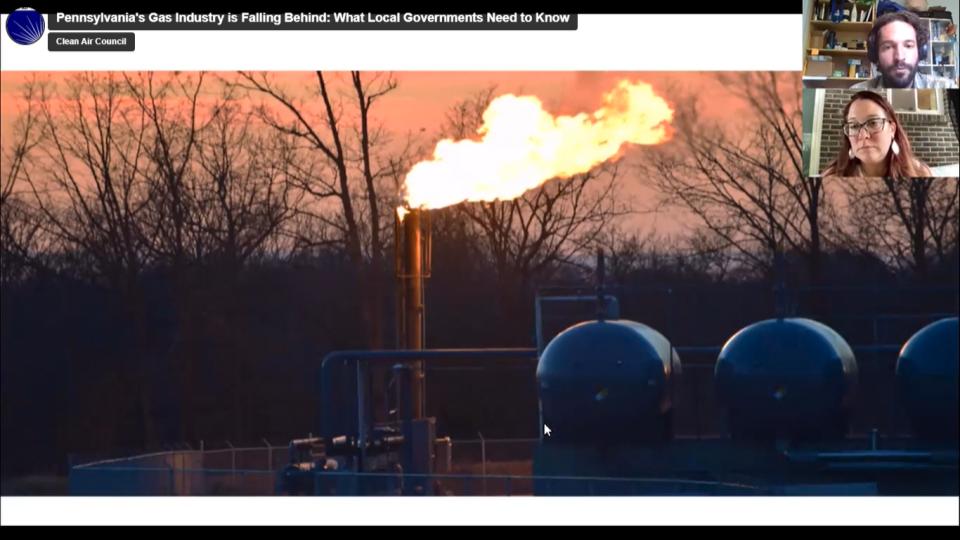Communities in Western PA Need the EPA’s Proposed Methane Rule

Westmoreland County, PA (July 25, 2022) — Clean Air Council staff has been working with local organizations in western Pennsylvania to encourage state and local governments to require the oil and gas industry to upgrade pollution controls using widely available technology. The Council worked with Protect Penn-Trafford (Protect PT), a local organization in Westmoreland County, to inform the Penn Township Zoning Hearing Board that Olympus Energy was proposing to use technology that the U.S. Environmental Protection Agency (EPA) will soon ban in its upcoming federal standard to cut climate-changing methane and smog-causing volatile organic compounds (VOCs), including the known carcinogen benzene.
The EPA has already published extensive research finding that pressure control devices known as intermittent bleed pneumatics leak methane and VOCs at levels far higher than previously estimated, particularly when they don’t have proper maintenance. These devices use the force of gas to open and close valves that control the flow of gas at drilling sites. After repeatedly opening and closing valves, this pressurized gas begins to continuously vent to the atmosphere, creating previously unaccounted-for air pollution.
In its upcoming pollution standard for existing oil and gas facilities, EPA is proposing to require pneumatic devices that use pressurized air or electricity (rather than gas itself) to open and close valves at oil and gas facilities, which would eliminate significant air pollution sources. The gas industry could also capture the gas vented to the atmosphere and direct it back into pipelines, reducing air pollution and saving more of their product. The Pennsylvania Department of Environmental Protection (DEP) and local zoning boards continue to approve and permit drilling proposals using outdated pneumatic devices that vent large amounts of air pollution to the atmosphere.Clean Air Council staff continues to advocate at every level of government against the use of this polluting technology.
Currently, Clean Air Council is urging its supporters to tell the EPA to finalize the strongest air pollution regulations possible. This includes a ban on gas flaring or venting unless in absolute emergencies, consistent methane monitoring at all oil and gas facilities (including smaller, leak-prone wells), and requiring “no-bleed” pneumatic controllers and pumps at all gas wells and compressor stations.
Council staff has also been heavily engaged in the state permitting process for a series of gas wells and compressor stations owned by MarkWest Liberty Midstream & Resources, LLC. In 2018, EPA and DEP settled a major lawsuit with MarkWest regarding underestimated air pollution from 237 of its drilling sites and compressor stations in Ohio and Pennsylvania, and required MarkWest to install and develop new pollution control technologies and apply for new, expanded air permits. Unfortunately, Clean Air Council believes that air pollution is still being underestimated from MarkWest’s facilities in Pennsylvania, particularly from pneumatic devices as well as other equipment used in gas drilling like “pigging” operations, used to release accumulated fluids and gases in pipelines. EPA and DEP’s settlement with MarkWest required the gas company to pay a penalty of $610,000 and invest over $2M in developing a new “pigging” device that would create less air pollution. The use of newly designed pollution control technologies requires stringent, continuous air monitoring to ensure that the device properly functions. DEP currently only requires, at most, quarterly air monitoring.
The EPA is currently considering community air monitoring networks as a part of its upcoming pollution standard for new and existing oil and gas facilities. This is absolutely necessary to identify a more accurate and comprehensive understanding of the amount and type of air pollution emitted by gas wells and compressor stations. Air pollution spikes can happen at any time and air pollution at oil and gas sites is known to increase over time as equipment ages. Clean Air Council is proud to work with local organizations to advocate for federal pollution standards that require upgraded pollution control technologies and continuous, community centric air monitoring while informing state and local governments about the latest research on air pollution from oil and gas facilities.
Please watch this online session detailing the Council’s work with Protect PT and email Russell Zerbo at rzerbo@cleanair.org for more information.

